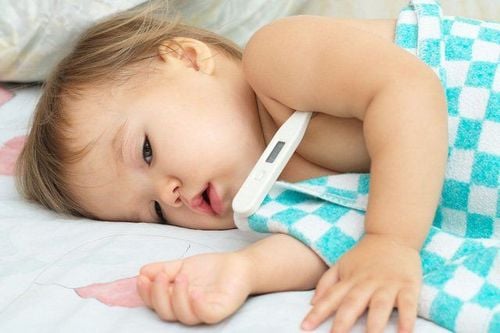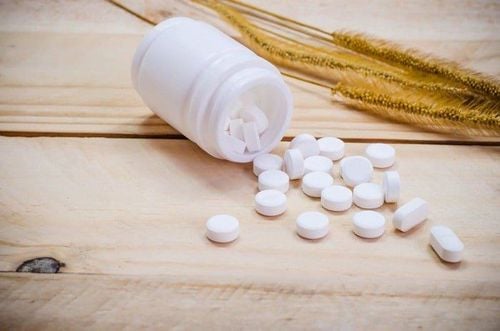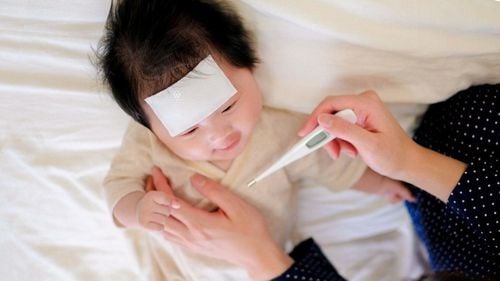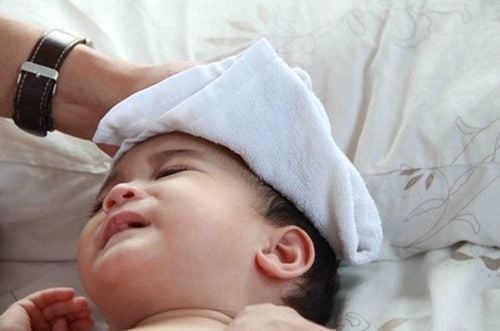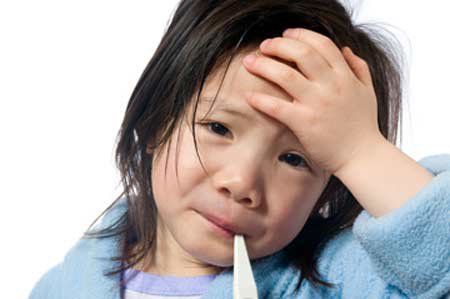This is an automatically translated article.
Parents often put their hand on the forehead of a child who seems sick, if it feels warm they will use a thermometer to confirm whether the child has a fever or not. But then many people don't know what to do when a child has a fever. There are some simple rules to keep a child with a fever comfortable and safe.1. What happens when your child has a fever? Acetaminophen can lower your child's temperature. Children over 1 month can take paracetamol to relieve pain and reduce fever symptoms. Dosage for children older than 2 years will be stated on the label. If the child is younger, ask the doctor about the appropriate dose of the medicine. Make sure that the medication is appropriate for the age and weight of the child, as overdose can be dangerous.
Another option is ibuprofen for babies 6 months and older, or pain and fever symptoms in children 3 months and older who weigh more than 6kg. Avoid taking ibuprofen if your child has asthma, unless advised by your doctor. In general, there is no need to give fever-reducing medications to children unless they are in pain or discomfort.
In addition, there are many other things you can do to help your child feel more comfortable. For example, put a cool compress on your head and keep the room at a moderate temperature - neither too hot nor too cold. Dress your child in light clothing and a thin blanket. You can also lower the temperature of a child with a high fever by wiping him/herself. Don't forget to give your child plenty of fluids to avoid dehydration.
2. Do's Never give aspirin to a child with a high fever (unless specifically directed by a doctor) to avoid the risk of a serious condition - called Reye's syndrome.
Adult cold and flu treatments should not be combined with young children, especially children under 4 years of age. For older children, there's still no evidence how well these methods work.
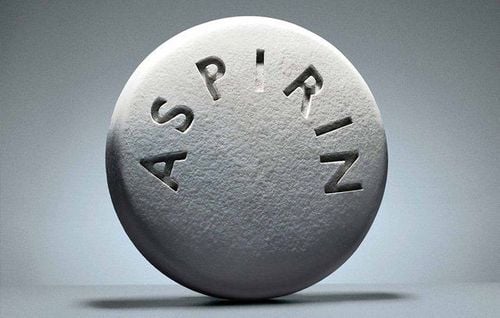
Cha mẹ không được tự ý sử dụng thuốc cho trẻ khi chưa hỏi ý kiến bác sĩ
If you decide to use cold medicine, consult your pediatrician to make sure the child is old enough to take it. According to the FDA, children under 2 years of age should not use any cough or cold products that contain decongestants or antihistamines. Even with children over 2 years old still need to be cautious. Also, do not give children under 4 years of age a combination cough and cold medicine product. Side effects can be serious, even life-threatening.
If the doctor says your child can take cough or cold medicine, read the label before buying and choose the one that best suits your child's symptoms. Do not switch between different medications without your pediatrician's consent.
Do not take ice cold baths or apply alcohol to the child's skin. This can really cause the fever to rise. Even if your child has chills, don't wrap him up in blankets or thick clothing.
3. When should you call the doctor? Usually, you don't need to take a child with a fever to the doctor. But sometimes a child's high fever can be a warning sign of a serious problem. Call your pediatrician if your baby:
Has a temperature of 104°F (40°C) or higher Under 3 months old and has a temperature of 100.4°F (38°C) or higher Fever persists for more than 72 hours (or more than 24 hours for children under 2 years of age) Have a fever along with other symptoms such as: Stiff neck, sore throat, earache, rash or severe headache Have a seizure Looks very tired, uncomfortable or unresponsive. 4. Tips for taking your baby's temperature If your child's face feels hot to the touch and looks red or pink, he or she may have a fever. You can check your baby's temperature with a thermometer.
Normal temperature in children is between 36.5 - 38°C, depending on location, age, activity level, time of day and body part. For example, body temperature is usually lowest in the early morning hours; highest in the late afternoon and early evening.
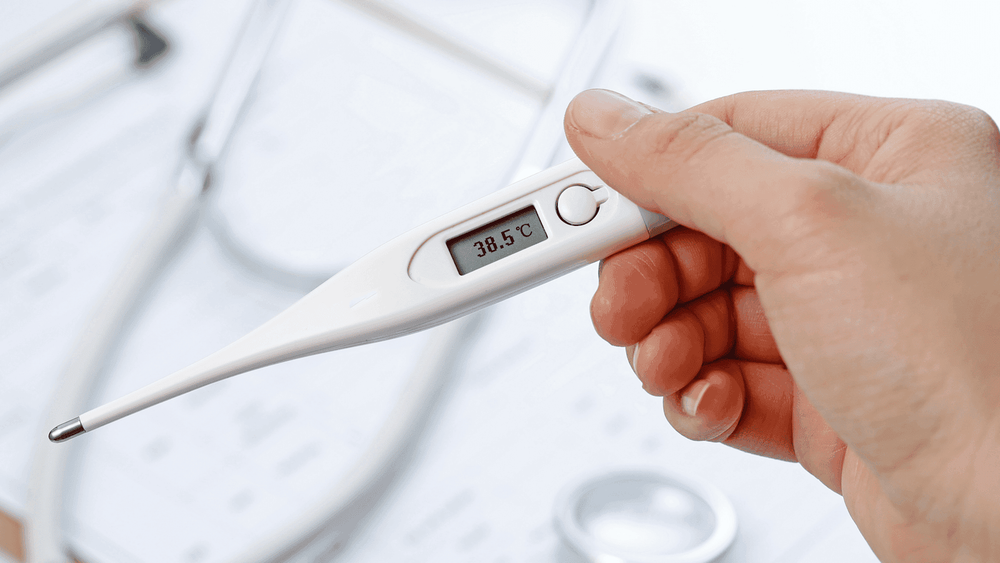
Cha mẹ nên sử dụng nhiệt kế để cho nhiệt độ cho trẻ
How often to check your child's temperature will depend on the specific situation. So you need to ask your pediatrician directly. Usually, you don't need to take your baby's temperature constantly or wake him up if he's asleep. But you should do it if your child seems weak, loses all energy.
Digital thermometer is the best choice for children, can be used in the mouth, rectum (anus) or under the arm (armpit).
For young children, rectal temperature is most accurate. If your child is 4-5 years old or older, taking an oral temperature is also quite accurate. The underarm measurement is not usually as accurate, but is easier to do. Remember to add one degree to the underarm measurement for the most accurate results.
In general, fever is quite common in young children and is usually mild. Sometimes the causes of a high fever in children need urgent attention, but in most cases the condition can be managed well at home if parents know the rules of how to deal with a fever. .
When a child shows abnormal signs of health, parents can take the child to Vinmec Health system for timely examination and treatment.
As a key area of Vinmec Health System, Pediatrics Department - Vinmec International General Hospital always brings satisfaction to customers and is highly appreciated by industry experts thanks to the following advantages:
gathers a team of leading doctors and doctors in Pediatrics: including leading experts, with high professional qualifications (professors, associate professors, doctorates, masters), experienced, having worked in different hospitals. big hospitals like Bach Mai, 108.. The doctors are all well-trained, professional, have a heart - reach, understand young psychology. In addition to domestic pediatric specialists, the Department of Pediatrics also has the participation of foreign experts (Japan, Singapore, Australia, USA) who are always pioneers in applying the latest and most effective treatment regimens. . Comprehensive services: In the field of Pediatrics, Vinmec provides a series of continuous medical examination and treatment services from Newborn to Pediatric and Vaccine,... according to international standards to help parents take care of their baby's health from birth to childhood. from birth to adulthood Specialized techniques: Vinmec has successfully deployed many specialized techniques to make the treatment of difficult diseases in Pediatrics more effective: neurosurgery - skull surgery, stem cell transplantation. blood in cancer treatment. Professional care: In addition to understanding children's psychology, Vinmec also pays special attention to the children's play space, helping them to have fun and get used to the hospital's environment, cooperate in treatment, improve the efficiency of medical treatment.
Please dial HOTLINE for more information or register for an appointment HERE. Download MyVinmec app to make appointments faster and to manage your bookings easily.
Reference source: webmd.com




